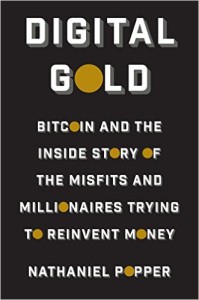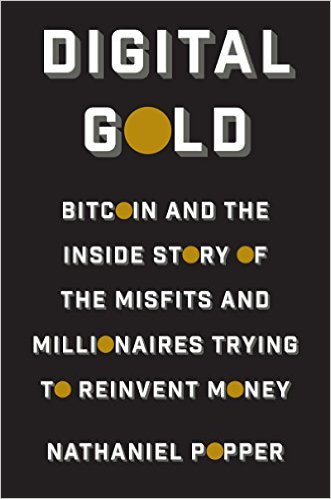
So, here’s the background to this intriguing book about Bitcoin.
If you’ve ever thought much about money, you may have wondered what gives it its value, especially if you’re aware that Richard Nixon took the dollar off the Gold Standard more than forty years ago. And if you’re at all involved in the world of finance and investment, you know perfectly well that very little money is tangible in any way: it’s almost all electrons, whizzing around the Internet at unspeakable speeds — and the ways in which we store and transfer money (bank accounts, credit and debit cards, checks, cash) are all notoriously vulnerable to loss, theft, and misappropriation. Wouldn’t it stand to reason in this age of the Internet that there should be a better, faster, more secure, and more reliable way to transact business?
Estimated reading time: 5 minutes
That’s the thinking that has led many venturesome individuals to create alternative currencies. Traditionally — and unsurprisingly — most of these alternative currencies have been paper-based. (Yes, there are dozens of them.) In recent times, though, especially since the advent of the Internet, innovative thinkers have been programming computers to create entirely new forms of money that are completely divorced from material reality. After all, there are just three fundamental functions that money must perform: “providing a medium of exchange, a unit for measuring the cost of goods, and an asset where value can be stored.” And none of these requires that money must be something you can hold in your hands.
Digital Gold: Bitcoin and the Inside Story of the Misfits and Millionaires Trying to Reinvent Money by Nathaniel Popper (2013) 432 pages ★★★★☆
Enter Bitcoin, the best-known of a long line of software-based alternative currencies. Introduced in 2009 by someone using the name Satoshi Nakamoto (probably a pseudonym), Bitcoin has attracted more media attention than all the other alternative approaches combined. The early adopters of Bitcoins were self-styled libertarians who saw the new currency as a way to free society from the grip of government everywhere. However, Bitcoins didn’t rise to the attention of many others until one early adopter — an anarchist, really, despite what he might have called himself — set up a website for drug dealers and arms traffickers called Silk Road. The enormous traffic in Bitcoins created by Silk Road raised the level of activity manyfold and helped Bitcoin gain wider acceptance.
Later, more mainstream investors and entrepreneurs became involved in the Bitcoin phenomenon, and government agencies inevitably took notice. “The unmistakable irony of these wild days,” writes Nathaniel Popper in Digital Gold, “was that a technology that had been designed, in no small part, to circumvent government power was now becoming largely driven by and dependent on the attitudes of government officials.” Not just in the United States, either. The Chinese government cast an even more jaundiced eye on Bitcoins than the U.S. government.
The big banks take notice
As the word about Bitcoin spread through the financial marketplace, word leaked out that JPMorgan “began secretly working with the other major banks in the country . . . on a bold experimental effort to create [a system based on the technology behind Bitcoin] that would be jointly run by the computers of the largest banks and serve as the backbone for a new, instant payment system that might replace Visa, MasterCard, and wire transfers.” In other words, what began as a libertarian and anarchist effort to seize power from the hands of the Federal Reserve Bank, Wall Street, and the other arbiters of our financial lives might end up granting them even more power!
“[T]he system was set up so that, like gold,” Popper explains, “Bitcoins would always be scarce — only 21 million of them would ever be released — and hard to counterfeit. . . With a hard cap on the number of Bitcoins, users could reasonably believe that Bitcoins would become harder to get over time and thus would go up in value.” In fact, though Bitcoins were worthless when first created, the going price at this writing is now $235, having topped out last year at nearly $1,200. The price of Bitcoins is volatile, to say the least.
“One big hack away from failure”
Just in case you’re thinking of taking a flyer and filling your piggy bank with Bitcoins, you might ponder its vulnerability. “Bitcoin itself is always one big hack away from total failure,” as Popper writes.On several occasions, hackers have raised questions about the security of the currency: the holes they uncovered have been plugged, but it’s anyone’s guess whether there’s more to be discovered.
Digital Gold represents a thorough job of research. Its picture of the many strange characters who have played seminal roles in the development of Bitcoin is colorful — worth reading for its entertainment value alone. If you’re interested in finance and money, you’ll enjoy this book.
For more great reading
This is one of the Best books about innovation and of Good books about finance and economics I’ve reviewed here
Like to read books about business? Check out My 10 favorite books about business history.
If you enjoy reading nonfiction in general, you might also enjoy:
- Science explained in 10 excellent popular books
- Great biographies I’ve reviewed: my 10 favorites
- Top 10 nonfiction books about politics
And you can always find my most popular reviews, and the most recent ones, on the Home Page.



























